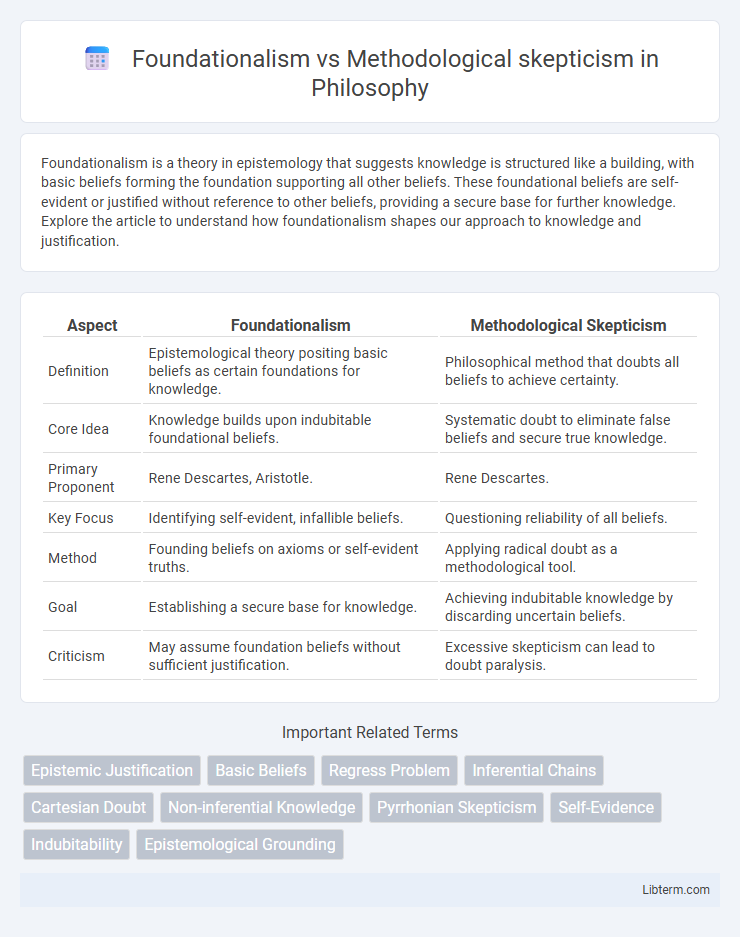Foundationalism is a theory in epistemology that suggests knowledge is structured like a building, with basic beliefs forming the foundation supporting all other beliefs. These foundational beliefs are self-evident or justified without reference to other beliefs, providing a secure base for further knowledge. Explore the article to understand how foundationalism shapes our approach to knowledge and justification.
Table of Comparison
| Aspect | Foundationalism | Methodological Skepticism |
|---|---|---|
| Definition | Epistemological theory positing basic beliefs as certain foundations for knowledge. | Philosophical method that doubts all beliefs to achieve certainty. |
| Core Idea | Knowledge builds upon indubitable foundational beliefs. | Systematic doubt to eliminate false beliefs and secure true knowledge. |
| Primary Proponent | Rene Descartes, Aristotle. | Rene Descartes. |
| Key Focus | Identifying self-evident, infallible beliefs. | Questioning reliability of all beliefs. |
| Method | Founding beliefs on axioms or self-evident truths. | Applying radical doubt as a methodological tool. |
| Goal | Establishing a secure base for knowledge. | Achieving indubitable knowledge by discarding uncertain beliefs. |
| Criticism | May assume foundation beliefs without sufficient justification. | Excessive skepticism can lead to doubt paralysis. |
Introduction to Foundationalism and Methodological Skepticism
Foundationalism asserts that knowledge is built upon basic, self-evident beliefs serving as the secure foundation for further knowledge acquisition. Methodological skepticism, pioneered by Rene Descartes, systematically doubts all beliefs to identify indubitable truths, aiming to establish certainty through rigorous questioning. Both approaches address the problem of knowledge justification but diverge in methodology: foundationalism posits inherent certainties, while methodological skepticism employs radical doubt as a tool for epistemic clarity.
Historical Background of Epistemology
Foundationalism traces its roots to ancient Greek philosophy, notably Aristotle's idea of knowledge building upon self-evident truths, while methodological skepticism emerged prominently during the 17th century with Rene Descartes' radical doubt approach to establish certainty. Epistemology's historical background showcases a progression from the search for indubitable foundations in foundationalism to the rigorous questioning methods in methodological skepticism. These frameworks have shaped modern epistemological debates by addressing the criteria for justified belief and knowledge validation.
Core Principles of Foundationalism
Foundationalism asserts that knowledge is structured upon indubitable basic beliefs that serve as the foundation for all other justified beliefs, emphasizing certainty and self-evidence in these core principles. These foundational beliefs are infallible or immune to doubt, providing a secure base from which further knowledge is logically derived. This contrasts with methodological skepticism, which systematically doubts all beliefs to identify what can be known for certain, whereas Foundationalism prioritizes established, foundational truths as the starting point for epistemic justification.
Central Concepts of Methodological Skepticism
Methodological skepticism centers on systematically doubting all beliefs to establish certainty by identifying indubitable truths, contrasting with foundationalism's approach of building knowledge upon self-evident foundations. Key concepts include radical doubt, where every belief is questioned; the quest for an absolute, undeniable truth, such as Descartes' cogito ("I think, therefore I am"); and the iterative process of refining knowledge by discarding unreliable premises. This rigorous skepticism serves as a methodological tool to achieve epistemic clarity and robust justification for knowledge claims.
Key Philosophers: Descartes and Beyond
Rene Descartes, often regarded as the father of modern philosophy, established foundationalism by seeking indubitable beliefs as the secure foundation for knowledge, famously asserting "Cogito, ergo sum" as the first principle. In contrast, methodological skepticism, also championed by Descartes, involves systematically doubting all beliefs to eliminate uncertainty, a method that influenced later philosophers such as David Hume, who extended skeptical inquiry to question empirical knowledge. Contemporary epistemologists continue to debate the balance between these approaches, examining how foundational certainties can coexist with methodological doubt in building robust epistemic frameworks.
Comparing Approaches to Justification
Foundationalism asserts that knowledge is structured on basic, self-evident beliefs that provide a secure foundation for all other justified beliefs. Methodological skepticism systematically doubts every belief to identify those that can withstand rigorous scrutiny, serving as a method rather than a theory of knowledge. While foundationalism emphasizes indubitable starting points for justification, methodological skepticism prioritizes continuous questioning to achieve epistemic certainty.
Strengths and Weaknesses of Foundationalism
Foundationalism provides a robust framework by establishing indubitable beliefs as the basis for knowledge, ensuring certainty and clarity in justification processes. Its strength lies in preventing infinite regress and offering a clear structure for knowledge acquisition, yet it struggles with identifying truly self-evident foundational beliefs, which can be both arbitrary and culturally biased. This limitation exposes Foundationalism to criticism for potentially overlooking the complexity of human cognition and the dynamic nature of knowledge development.
Critiques of Methodological Skepticism
Critiques of methodological skepticism emphasize its excessive doubt as leading to infinite regress and the problem of absolute certainty, which is often unattainable. Foundationalism counters this by asserting the existence of self-evident or indubitable beliefs that serve as secure epistemic foundations. Critics argue methodological skepticism may undermine practical knowledge by dismissing everyday experiences as unreliable, making it less applicable outside of theoretical inquiry.
Contemporary Debates and Applications
Foundationalism asserts that knowledge is built upon indubitable basic beliefs, while methodological skepticism employs systematic doubt to challenge the certainty of all beliefs, as seen in contemporary epistemology debates assessing the limits of human knowledge. In modern cognitive science and artificial intelligence, foundationalism influences knowledge representation by emphasizing secure data inputs, whereas methodological skepticism underpins algorithms designed to rigorously test hypotheses and weed out false beliefs. Applications in legal reasoning and scientific methodology illustrate ongoing tensions between accepting foundational premises versus continuously questioning assumptions to enhance the reliability of conclusions.
Conclusion: The Ongoing Significance in Philosophy
Foundationalism anchors knowledge on indubitable basic beliefs, while methodological skepticism persistently questions the certainty of all knowledge claims, fostering critical inquiry. Their ongoing significance in philosophy lies in shaping epistemological frameworks that balance secure foundations with rigorous doubt. Contemporary debates continue to explore this interplay, influencing theories of justification and the pursuit of truth.
Foundationalism Infographic

 libterm.com
libterm.com